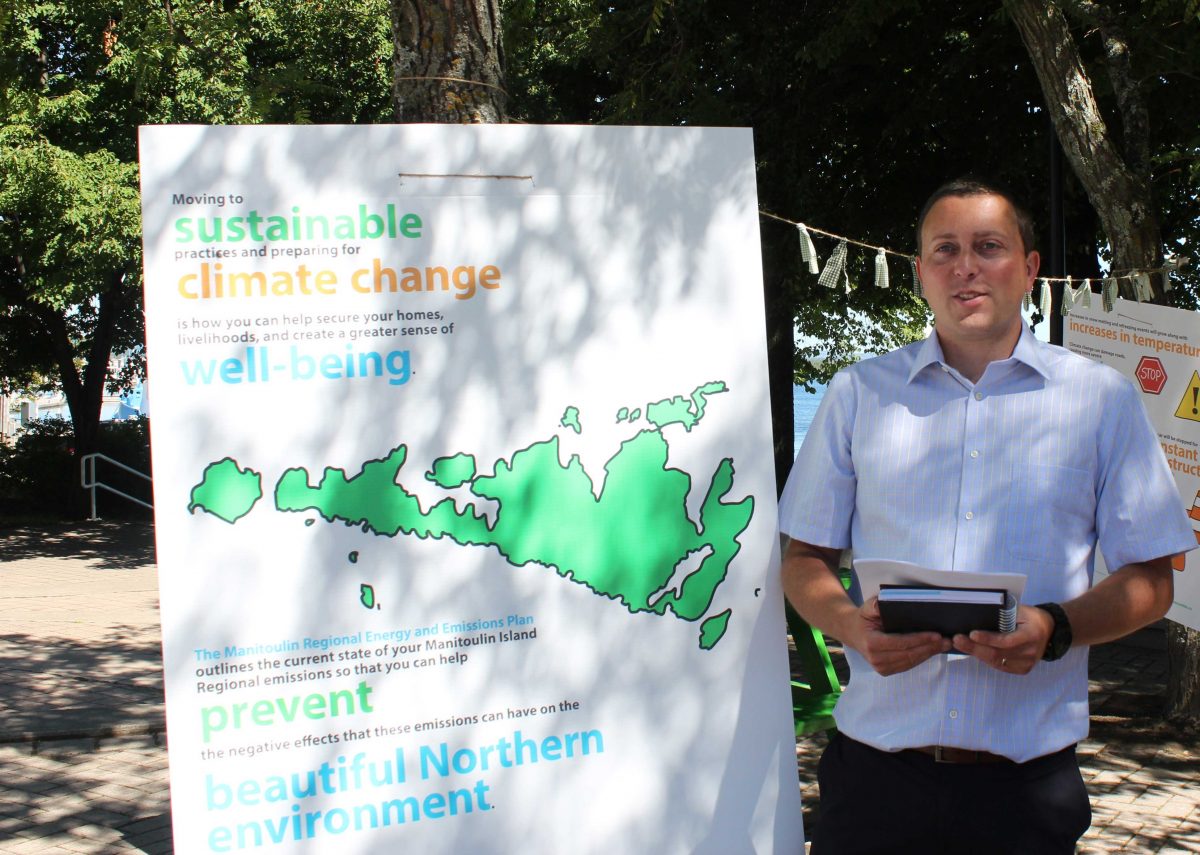MANITOULIN – Smart Green Communities, a reThink Green program working in consultation with municipalities, townships and First Nation communities throughout Manitoulin Island and the North Shore, has launched a public consultation on two regional energy and emissions plans (REEPs): a two year-year study of the region’s collective greenhouse emissions and what that means for the future.
The primary goal of the REEPs is to assist these communities in meeting their energy and emission reduction goals by understanding how much they currently emit. This work paves the way for more collaboration between municipalities and communities to reduce their energy costs, decrease carbon emissions and address the identified risks of climate change.
“With a predicted shift in average precipitation levels we could see a combination of extreme rainfall events, leading to more frequent flash flooding and harsher droughts due to prolonged periods of drier weather,” said Simon Blakeley, director of Green Economy North and Smart Green Communities. “Northern Ontario must prepare for the increase in damage, and associated costs, predicted from climate change.”
The REEPs consider how climate change could impact the unique circumstances of the region by utilizing the Climate Atlas’ regional climate data as part of its research. The data forecasts the average precipitation for the North Shore communities and Manitoulin Island will increase by approximately 5.5 centimeters between 2021 and 2050—given a business-as-usual scenario.
“If we prepare in advance for climate change, we can better plan for road repairs, construction projects and other expenses listed in municipal asset management plans,” Mr. Blakeley continued. “With each climate challenge comes an opportunity to develop more sustainability, while at the same time addressing identified energy and infrastructure needs.”
The data also forecasts that the region could see a substantial average summer temperature increase. The result would not just put a greater strain on power grids it would also create an environment more hospitable for insects like mosquitoes and ticks to carry Lyme disease or West Nile virus. While the increase only translates to an average rise of 2.3 degrees, it will also force longer summers and shorter winters.

“We hope to see more initiatives put in place to reduce the impact this data predicts,” said Angela Jiang, program officer for Smart Green Communities. “Our hope is that the REEPs will bring groups to work collaboratively on producing robust climate action plans and other strategic planning documents to minimize the effects of climate change.”
Another component of the study has been to establish a community of practice that includes REEP-specific project advisory groups for these communities with the capability to both strengthen existing energy planning processes and broaden the scope of renewable, clean and energy efficient solutions for the area.
A public consultation on the REEPs took place in Little Current this past Tuesday. The REEPs are also available at www.smartgreeencommunities.ca along with a corresponding survey that will impact the mitigation strategies going forward.
The REEPs are funded by the Federation of Canadian Municipalities (FCM) Transition 2050 and the Independent Electricity System Operators (IESO) Education and Capacity Building Program (ECB).
The report recommends that Manitoulin municipalities and First Nation communities should establish clear goals and priorities for climate-led action. “These objectives should be fully integrated within the organization’s strategic and asset management-oriented reports, plus other guiding documentation. Such an approach will not only exert maximum influence regarding the risks posed by climate change but continue to guide a broad range of plans, programs and activities offered at the local levels addressing transportation emissions; reducing commercial and residential sector emissions; and strong water and waste water energy efficiency standards. Climate Action plans should again identify measures by which communities can increase water conservation, reduce waste water and promote more innovative and energy efficient approaches to life cycle management including the uptake of commercial and household water retention and recycling techniques. In addition, water conservation and demand management practices should apply to the island as a whole.
“It is important that municipalities and First Nation communities demonstrate leadership in making the necessary changes to reduce their own carbon footprint by enacting and implementing policies that reduce GHG emissions arising from their operations,” the study notes. “In conclusion, climate action plans should be developed through an open and inclusive process which engages individuals from diverse backgrounds and different age groups to harness their perspectives, insights and areas of expertise. Participants could include but should not be limited to year-round and seasonal residents, business owners, community interest groups, architects, accountants, environmental, Indigenous and public health professionals, among others. The process itself should be informed by an engaging public outreach strategy which clearly and succinctly identifies the issues at stake and is both relatable and accessible to those who engage in it. The negative effects of climate change will affect everyone, especially marginalized and vulnerable groups, so it is justifiable that all should have a hand in developing mitigation and adaption plans to address it.”





